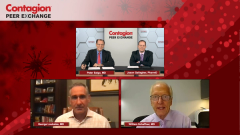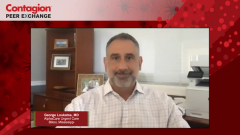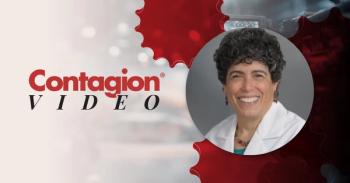
Final Thoughts on COVID-19 and Flu
Final thoughts from experts on controlling COVID-19 and influenza.
Episodes in this series

Transcript:
Peter Salgo, MD: What advice do you have for community clinicians and pharmacists for controlling the flu coming up alongside COVID-19? What do you think people should simply do proactively?
Jason Gallagher, PharmD: That almost becomes a simple question. Control is an illusion, right? But if there’s any way to do it, the answer is clear: vaccination. The vaccines for COVID-19 are phenomenally effective overall. There are going to be breakthroughs. They’re quite publicized when it occurs, but overall, they’re still very effective and have been effective through the different variants. That’s an important message that’s getting lost. I’m very happy to hear that vaccine uptake has been taken up in the south somewhat, because I often hear people saying that the vaccine isn’t going to work against the delta variant because of some mixed media message. That’s not true. Vaccinate, vaccinate, and vaccinate are the 3 most important things when it comes to controlling these diseases.
Peter Salgo, MD: What do you think, Bill? Is he right?
William Schaffner, MD: Of course Jason is right. Because this is going out to a professional community, I would emphasize that being vaccinated ourselves against COVID-19 and influenza are professional and ethical responsibilities. It’s a patient safety issue. And you should make sure that everyone in your practice setting, whatever it is, also gets vaccinated against both COVID-19 and influenza. Do the best you can to model that behavior for your patients and, of course, for the benefits for yourself.
Peter Salgo, MD: That’s what motivated me early on to get the vaccine. I was worried about myself. But as a physician, I felt I had a responsibility to the patients I saw. I got vaccinated to give my patients the best shot I could at them not getting COVID-19 from me. Jason, you said something I like because it reminds me of a quote from Einstein. You said vaccination may be an illusion.
Jason Gallagher, PharmD: Control.
Peter Salgo, MD: Control is an illusion. That’s it. Einstein once said that reality is an illusion, but it’s a very convincing one.
Jason Gallagher, PharmD: I wouldn’t know if he’s right or not.
Peter Salgo, MD: Well, by definition. I liked that. In the little time that we have remaining, I want to ask each of you to give us a last thought. Something you’d like to sum up and leave us with to give us a sense of where we are and where you think we’re going. George, we’ll start with you.
George Loukatos, MD: The 1 thing the pandemic has taught us, and the recurring theme through this conversation, is that we’re in a state of flux and we’re doing the best we can to stay ahead of the curve, whether it’s influenza, COVID-19, or any other type of infectious disease process. The recurring theme is that as clinicians, as part of the medical community, we need to do our best to educate ourselves and stay ahead of the information curve so we can properly educate the public and maintain their confidence.
It’s important for us to be open and say, “This is our best guess right now. I’m not telling you that this is absolute, but this is what we know from the data that we’ve had and the data we’ve accumulated. These are my recommendations based on that.” Let them know that you’ve done your research and are staying ahead of things so that they’re confident, whether it’s convincing someone to take a vaccine, educating them about the importance to quarantine, or just how to care for their family and aftercare. It’s important to stay up to date on those things. That’s where our focus needs to be.
Peter Salgo, MD: Bill?
William Schaffner, MD: George gave my little talk. I will emphasize with slightly different words that, as he was saying, the only constant is change. We’re still writing the textbook for COVID-19. We’ll have to stay up to date with what’s happening because COVID-19 is likely to throw us a few more curveballs down the road. But COVID-19 is not the only respiratory disease. We’ve been talking about influenza. Influenza will soon be upon us, and influenza vaccination season comes before flu season. We’re going to have to vaccinate our patients with flu vaccine also.
Peter Salgo, MD: And ourselves, right?
William Schaffner, MD: Absolutely.
Peter Salgo, MD: OK. I’m going to give you the last word, Jason. Go for it.
Jason Gallagher, PharmD: Thank you. It’s interesting how similar our concluding thoughts are. To me, infectious diseases teach humility, and COVID-19 has been a big educator. So much has changed. With some of the messaging that people get, they’re looking for absolutes, and we have to be careful and straightforward and say, “This is what I think based on this. It may change if something else happens.” I didn’t have the summer called right. I thought we’d have a great summer and a pretty bumpy fall. Then delta came by and changed so much. Going forward, we’re definitely better informed with better tools and better therapies than we were, but we can’t say what tomorrow is going to bring.
Peter Salgo, MD: I want to thank all of you for being here. We’re going to revisit this, obviously. As all of you pointed out, this is a topic that keeps changing. The virus keeps changing. Our response to both the flu and COVID-19 keeps changing. And our therapeutics keep changing. If I heard all of you correctly, it seems to me that the more we understand, we have different effective pathways for dealing with each virus. That it makes it even more important to figure out which virus we’re dealing with. Do that effectively, cost-efficiently, and quickly so that we can get the therapy underway while it still has a chance of making a significant clinical difference. With that, maybe we’ve got a shot.
We’re already doing better than many people thought we ever would. I used to say that a viral disease is a real problem but that we’re not going to get anywhere. That was a generation ago. Pterodactyls were flying through the sky at that time. That’s no more. Things are better. Therapeutics are better. Diagnosis is key, and getting the right diagnosis for the right virus—for the right therapeutic—is also key. This has been very educational for me.
I want to thank you for watching this ContagionLive Peer Exchange. If you enjoyed the content, please subscribe to our e-newsletters to receive upcoming Peer Exchange segments and other great content right in your in-box.
Transcript edited for clarity.
Newsletter
Stay ahead of emerging infectious disease threats with expert insights and breaking research. Subscribe now to get updates delivered straight to your inbox.


































































































































